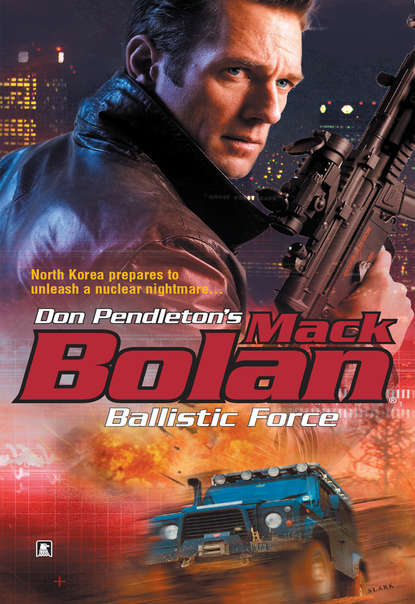По всем вопросам обращайтесь на: info@litportal.ru
(©) 2003-2025.
✖
Ballistic Force
Автор
Год написания книги
2019
Настройки чтения
Размер шрифта
Высота строк
Поля
Yulim nudged Na-Li’s bag closer to her and zipped it open.
“Go ahead,” he encouraged her. “Everything’s there, more or less. See for yourself.”
Na-Li stared at the bag, then glanced up at Yulim.
“Why?”
Yulim smiled benevolently. “I thought there might be something you’d like to take back with you to the barracks,” he said. “You can take one item. Anything you want.”
Na-Li remained on her guard as she tentatively opened the bag and inspected its contents. Her wallet had been confiscated along with her CD player, her music and a sharp-handled comb, but otherwise, as Yulim had assured her, everything else she’d packed for the fishing trip was still there. A few days ago, if told to pick one item from the bag, she, without question, would have taken her makeup kit. In light of everything that had happened, however, the last thing she wanted was to make herself look more attractive. So, instead, she selected her charm bracelet, a cheap piece of jewelry to which, over the years, she’d attached a handful of small knick-knacks, each one reminding her of a special time in her life.
“That would have been my guess,” Yulim told her. “It has sentimental value, yes?”
Na-Li’s first instinct was to scream at the man and tell him to quit trying to be so nice to her. She wanted to damn him for the way he’d abused her and let him know that she’d overheard him conspiring with the other officer. She wanted to tell him that if was the last thing she did, she’d find a way to use that information to make him pay for what he’d done to her. Instead, however, she merely nodded demurely and closed her fingers around the bracelet.
“I can go, then?” she asked.
“Of course,” Yulim told her. He indicated the guard and said, “He’ll take you back to your family. In a moment. First we need to reach a little understanding.”
Abruptly the smile left the lieutenant corporal’s face. He reached forward and grasped Na-Li by the jaw, tilting her head upward so that she had no choice but to stare into his eyes.
“You’ll be back,” he advised her, his voice cold with menace, “and no one is to know about what goes on in this room. Is that clear?”
Na-Li’s eyes widened with fear. The way Yulim was holding her jaw, it was impossible for her to speak. All she could do was nod.
“If you talk—to anyone—I swear I’ll kill your mother and father, right in front of you,” Yulim warned. “And they’ll die slowly and they will be in great pain. Do you want that?”
Na-Li shook her head as best she could. Yulim glared at her a moment longer, then slowly removed his hand from her jaw. The smile returned to his face.
“I’m glad we understand each other,” he said. “And I look forward to our next visit.”
Na-Li felt a sickening knot in her stomach. Yulim stepped back and gestured to the guard, who, in turn, snapped his fingers and motioned for Na-Li to come with him. Trembling, the young woman followed the guard from the bedroom and through the bungalow to the front door.
Outside, the late-afternoon sun shone brightly and Na-Li had to squint as she took the first few steps down the walk leading to the camp barracks. Once her eyes had adjusted to the light, she noticed the activity in the work yard. Rha-Tyr’s back was turned to her as he hammered away at the rock pile. The teenager belonged to their high school water polo team back in Seoul and Na-Li had always been captivated by his swimmer’s physique, but now the sight of his glistening torso reminded her of the sweating man who had just raped her. Repulsed, she looked away and her gaze fell on her mother and Ji Lhe-Kan. The two women were standing near the barracks, watching her. U-Pol had her hand to her mouth and even from a distance Na-Li could see the look of horror in her mother’s eyes.
Once she’d been led to the entrance to the compound, another guard threw the gate open and impatiently waved her through. Na-Li continued to walk slowly until she realized that she was no longer being followed by the soldier who’d brought her from the bungalow. She quickly lengthened her strides, then finally broke into a run, rushing past Lhe-Kan into her mother’s waiting arms.
“My poor child,” U-Pol sobbed as she held her daughter close. “My poor baby! What did they do to you?”
Recalling Yulim’s warning, Na-Li bit her lower lip, fighting back the urge to tell her mother everything that had happened. When she failed to respond, U-Pol broke their embrace and stared at Na-Li, whose jaw was still discolored where the officer’s hand had clenched it in his viselike grip.
“What did they do to you!” she repeated.
“Nothing,” Na-Li murmured. Grasping for some convincible lie, she told her mother, “They just had a lot of questions. They were just questioning me!”
U-Pol put her fingers to Na-Li’s jaw. “This is not from questioning,” she said.
“It doesn’t matter, Mother,” Na-Li said. “Please, can we not talk about it?”
Now that she had seen evidence of the unthinkable, the older woman could no longer turn a blind eye to what had happened. And, forced to confront the issue, U-Pol felt herself consumed by a sudden rage.
“They swore you to silence, is that it?” she guessed.
“Mother, please…”
U-Pol pulled her daughter back into an embrace, then stared over her shoulder at the surrounding mountainside.
“Don’t you worry,” she assured her daughter. “When your father learns of this, he’ll see that they pay! He won’t let them get away with this!”
LIM SEUNG-WHAN angrily stabbed his shovel into the heap of loose rock at his feet, then heaved the load into the ore cart resting on the rusting tracks extending deep into the mountainside. Beside him, his long-time friend Ji Pho-Hwa was attacking the cave wall with a pickax. When Pho-Hwa glanced his way, tears streaked through the soot caking his cheeks. Lim looked away, his face turning red with shame.
How had he allowed this to happen? Just two days ago the two men were enjoying themselves on the rear deck of Lim’s yacht, drinking and swapping stories as they waited for tuna to strike the heavy lines trailing from their fishing poles. Their wives were in the cabin playing mah-jongg and Pho-Hwa’s teenaged son was up on the foredeck flirting with Lim’s young daughter as they listened to some obnoxious rock-and-roll music on the radio. And after the fishing trip, Lim was looking forward to taking both families, along with his American cousin, Akira Tokaido, to watch his beloved Seoul Sky-Eagles at Freedom Stadium. Life was good. More than good. Things were perfect. And now? Now here he was, a prisoner of the KPA, separated from his wife and daughter, doomed to slave at the mines until the North Koreans decided what to do with him. All because he’d ignored Pho-Hwa’s warning not to venture too far north of Gyondongdo. “We’re here to fish,” Lim had teased his friend. “We need to go where the fishing is best.” He’d chided Pho-Hwa for being so worrisome, and after his friend had reeled in his first tuna of the trip—a four hundred-pounder that had put up a wonderful fight—Ji had stopped complaining and started to enjoy himself. Less than two hours later, the North Koreans had pulled up alongside the yacht and everything had changed.
There were eight other men working the vein alongside Lim and Ji, and so far they’d filled four carts with the rock they’d hacked loose from the cave walls. They were beyond the reach of daylight and had to work by the wavering glow of a kerosene lamp. Three armed guards watched over the group, filling the cave with the smoke of their cigarettes. Lim’s palms were bleeding where there had once been blisters, and the only thing that ached more than his arms was his lower back; it throbbed constantly and whenever he pitched another load of rock into the cart he felt a sharp, stabbing pain in his right hip. He didn’t dare stop what he was doing, however. When one of the other workers had slacked off a few minutes ago, complaining of leg cramps, the guards had laid into him with the stocks of their carbines, first targeting his arms and shoulders, then taking turns at his skull until they’d killed him. They pitched the man’s body into one of the carts and left it there as a warning for the others to keep working.
As he was shoveling yet another load into the cart next to the one containing the body, Lim Seung-Whan mustered the nerve to lean close to his friend and look him in the eye.
“I’m sorry, Pho-Hwa” he whispered. “Please forgive me.”
Вы ознакомились с фрагментом книги.
Приобретайте полный текст книги у нашего партнера:
Приобретайте полный текст книги у нашего партнера:











